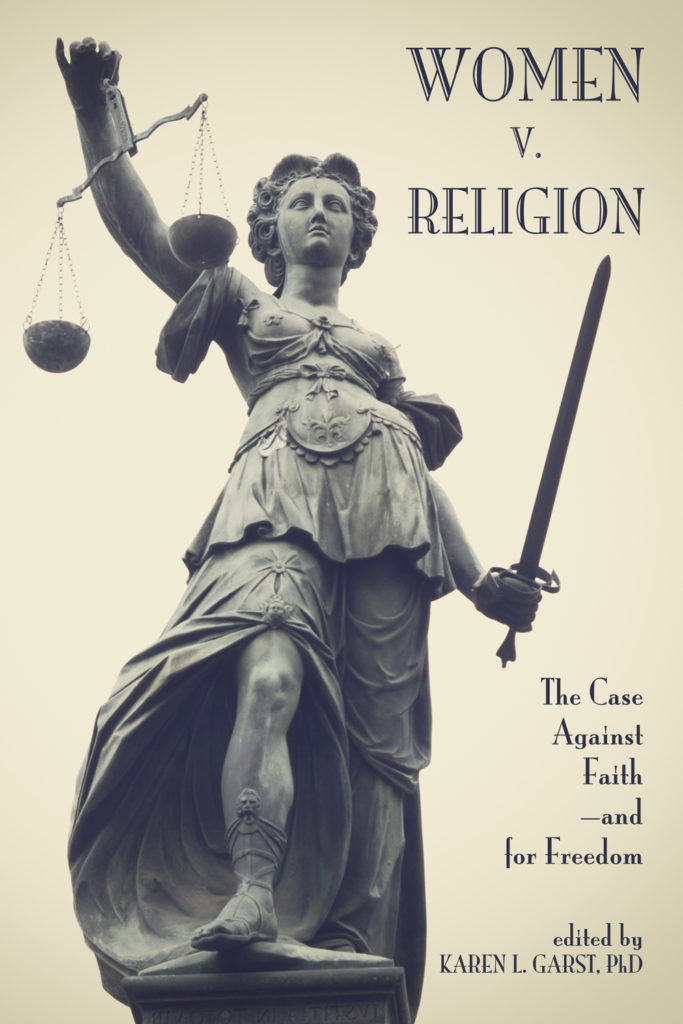Book Review, written by Teresa Roberts
With a bold title like Women v. Religion: The Case Against Faith… and for Freedom, Karen L. Garst has once again provided an opportunity for women who have suffered at the hands of religious doctrines to speak out. Her first book, Women Beyond Belief: Discovering Life without Religion, showcased the personal stories of 22 everyday women who left religion. This newest work, written by different authors, often professionals in their fields, focuses more on why women leave religion and how it is beneficial both to them and to society.
Although the fight for the rights of women in general is experiencing steady progress in many parts of the world, religious dogma has shown to be insidiously regressive, and a constant threat to societal advancement. That’s what makes the content of this book so relevant. Religion is at the very root of these political and social movements designed to drag women back into the Dark Ages. Culturally, the threads of religious indoctrination have been so closely woven into our collective psyches that they are often difficult to recognize, but as more and more women turn their backs on religion, it becomes harder to justify such blatant oppression. Even liberal Christians, one of the most progressive sects of Abrahamic faith, are now being forced to find a way to align their fight for social justice with a book that supports the pervasive belief in male superiority and female subjugation. As women gain personal autonomy, these Christians are challenged to find reasonable explanations for the archaic belief systems in the Bible, the very foundation of their faith.
Dr. Garst has managed for the second time to bring together a collection of bright women willing to share their perspectives about what it means to be a woman in a culture that worships old tomes packed full of harmful ideas. Traditionally, women from all over the world have been denied a place at the table with men. Abrahamic religion in particular has led astrong hand to the muzzling of women. The notion that women were responsible for the downfall of mankind and that they were created as an afterthought to accommodate males is well founded in their holy scriptures.
It is an absolute inspiration to read the words from women like Candace Gorham who has witnessed firsthand through her clinical practice the damage that religion does. Having been diagnosed with PTSD as a result of being raised in a Christian cult, I know the trauma that a young girl faces by experiencing the daily brainwashing of such harmful belief systems. Leaving an oppressive religion behind is a difficult task and the damage to my mental health was significant. It has taken years to rid myself of the shame and guilt and find freedom in following my own path. To have my experiences acknowledged and written about in such depth was life affirming.
This book is full of many such revelations as Dr. Garst was careful to include perspectives from women of different backgrounds and religions such as Deanna Adams who writes about the experiences of black women in America. She shows the historical importance of those brough there against their will as slaves and forced to transition from the faith systems of their ethnic groups to patriarchal Christianity. Or Aruna Papp who wrote a compelling chapter about the somber responsibilities she carried as a child born into a Christian Indian household. Trying to combine the cultural expectations already facing Indian women, she was also burdened with the limitations of Christianity. What an enormous challenge for a young girl.
From the transgender perspective to black and Hispanic experiences to Jewish law and Islam, the accounts are raw and powerfully persistent. They all insist on calling our attention to the challenges of being a woman in any culture upholding a belief system of oppression that is supposedly sanctioned by a god. What a horrible cultural construct, designed to subjugate women while giving absolute power to men. That kind of absolute power inflicts pain and suffering upon women as well as limits their autonomy. And, although each essay is different, they inevitably have one thing in common: religion stands firmly in the way of progress for women. It may very well be the last big obstacle that needs to be overcome. The evolution of our societies is significantly slower than it should be because of religious ideologies that continue to permeate our collective consciousness. Even in their complete absurdity by modern standards of morality, they persist. Old, archaic, even unscientific and harmful ideas live on and on and on while women are denied autonomy and freedom.
Dr. Garst has managed a literary accomplishment that forces us to open our eyes and acknowledge that it’s time to kick these outdated notions to the curb. Each essay written by a woman is a testament to their courage. By leaving their religious upbringings behind and embracing the responsibility that comes with true freedom, they set an example for all women. Furthermore, writing about sensitive, even controversial topics from the female perspective is long overdue. As more and more women leave religion, find their voices, and speak out, the great lie will be exposed. This book is packed full of thoughtful, well-written essays, making it very clear that religion has been one of the biggest lies ever perpetrated upon womankind.

